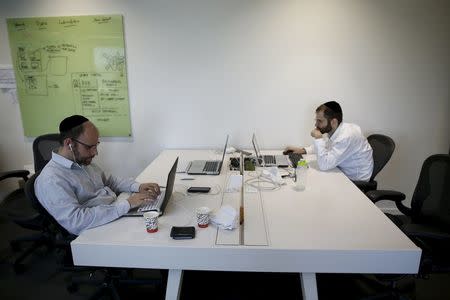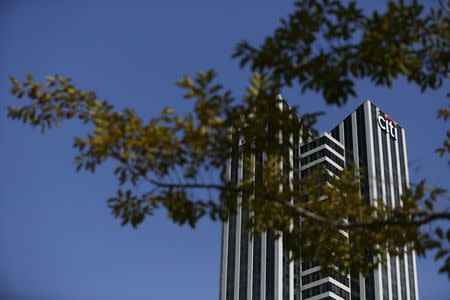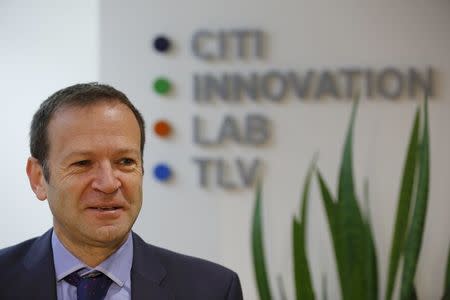'Fintech' expansion lures foreign banks to Israel
By Tova Cohen TEL AVIV (Reuters) - A five-minute chat with an executive from Israeli start-up MyCheck was enough to spark the interest of Mariano Belinky, managing partner at Banco Santander's venture capital division. After more formal follow-up meetings, the Spanish bank made its first foray into Israel, investing an undisclosed sum in MyCheck, which develops customized mobile payment apps for restaurant chains such as The Cheesecake Factory. With many clients in the hospitality sector, Santander was intrigued by the possibility of providing "a new and better solution for our clients," Belinky told Reuters at a financial technology (fintech) event hosted by Santander in Tel Aviv last month. He now expects Santander InnoVentures, which has $100 million to invest over two years, to make one or two investments in Israel annually, the only market it invests in without also having a banking operation. For years, Israel tried to entice foreign banks to come and compete with domestic operators, with little success. Now, foreigners are finally coming, but not to open up bank branches. It's Israel's skills in the flourishing space where technology and finance meet that is drawing them in. Major banks such as Citi, Barclays and Santander have all set up hubs and are investing in or mentoring start-ups in the burgeoning fintech sector. The smartest technologies are likely to be implemented at their banks. Originally fintech applied to technologies that helped financial institutions conduct transactions faster and more cheaply. Today, fintech ranges from risk management and data security to mobile banking and alternative currencies. Globally, investment in the sector tripled to $12 billion in 2014, according to Accenture. With expertise in security, mobile communications and big data analysis crafted in military intelligence units, Israel is helping financial groups to serve customers better. "There's a very strong innovation culture here which is clearly exciting," Belinky said, noting Santander InnoVentures also invested in three U.S. start-ups and one in Sweden. MyCheck Chief Financial Officer Itai Nebenzhal said Santander was expected to implement MyCheck's technology for its customers in 2016. CITI MOBILE APP Citi, which has invested tens of millions of dollars in its Tel Aviv tech hub and has received a five-year government grant of $25 million, is already deploying Israeli technology. Citi's Tel Aviv lab developed the mobile app for "Citi Velocity", one of the largest trading and research platforms for institutional investors, with daily volume exceeding $3 billion. The app is the only one providing market research and trading capabilities under one roof for foreign exchange, Citi said, adding other businesses such as equities, interest rates and commodities are looking to incorporate the app. The Tel Aviv lab, which works with tech teams in London and New York and employs 140 people, focuses on mobile and big data R&D, said Neil Corney, Citi Israel's chief country officer. According to the Israel Venture Capital Research Centre, in 2014 there were 379 companies and 14 foreign R&D centers working on financial technology in Israel. Fintech start-ups raised $369 million in 2014, up from $13 million in 2009. While data from 2015 is not available, there was a significant increase this year, said Yoav Caspi, a partner in the AYR law firm who handles many fintech clients. RISING M&A Six companies were sold in 2014 for a total of $695 million, the largest being the sale of mobile paying app Check to Intuit Inc for $360 million. This number is set to soar in 2015 with one deal alone -- the acquisition of payment services provider Fundtech by Canada's D+H -- valued at $1.25 billion. Outdated regulations in Israel, high costs for developing an initial product and lack of knowledge regarding the needs of financial institutions made it difficult in the past for Israeli start-ups to stand out, Caspi said. But as fintech start-ups began targeting enterprises and end-users, rather than just banks, more Israeli entrepreneurs began to find the sector attractive, he said. Barclays, the first foreign bank to open a lab under the auspices of a Finance Ministry program to encourage financial institutions to invest in fintech, is establishing a scheme to mentor 10 Israeli start-ups at a time, similar to programs it has in London, New York and Cape Town. In Israel, the bank will focus on cyber security, blockchain -- the technology underlying digital currency Bitcoin -- and compliance solutions, said Michal Beinisch, chief operating officer of Barclays Israel. Barclays believes adopting technologies from start-ups will help it compete with advanced financial technologies including mobile payment and digital wallet services. "We realized what all the banks are realizing - unless we go with open innovation rather than internally developed solutions the way banks previously did, banks will lose out to the technology companies," she said. (Editing by Rachel Armstrong and Keith Weir)









